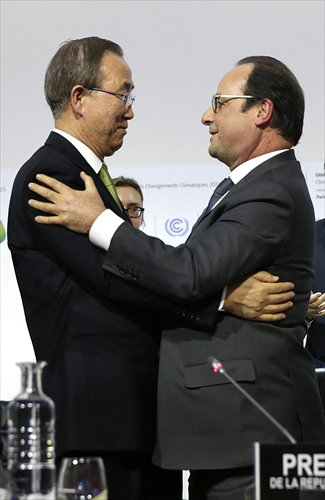Paris pact met with cautious optimism
Deal fair in responsibility sharing: FM

French President Francois Hollande (right) and UN secretary general Ban Ki-moon hug each other during the final session of the COP21 United Nations climate change conference in Le Bourget, near Paris, on Saturday. A "historic" pact was inked after a week of painful negotiations. Photo: AFP
The landmark climate agreement reached in Paris is expected to set the course for a shift that relieves the world from its reliance on fossil fuel, but analysts remain concerned over the effective implementation of the plan to arrest global warming.
Adopted by the 196 Parties of the United Nations Framework Convention on Climate Change on Saturday, the Paris Agreement sets a target of holding the global average rise in temperature below 2 C above pre-industrial levels, and preferably below 1.5 degrees.
It also requires rich nations to maintain a $100 billion a year funding pledge beyond 2020, and use that figure as a "floor" for further support agreed on by 2025, providing greater financial security to developing nations as they wean themselves away from coal-fired power.
China's foreign ministry said on Sunday that the agreement is fair in splitting responsibility between developed and developing countries.
Hong Lei, China's foreign ministry spokesman, called the agreement "comprehensive, balanced and powerful" and said China appreciates the efforts that all parties have made.
The agreement, which takes effect in 2020, acknowledges "common but differentiated responsibilities and respective capabilities, in light of different national circumstances." The language means that developing countries, such as China and India, can gradually enhance their emission reduction efforts without engaging in absolute reductions.
Ambiguity remains
Following the adoption of the agreement, China's Special Representative on Climate Change, Xie Zhenhua, said although the agreement is not perfect and there exists provisions that require improvement, the agreement represents the broad consensus reached by different sides.
Xie stressed that China, as a responsible developing country, will take international obligations commensurate with its own national conditions, development stage and actual capacity.
He called on developed countries to abide by their promises to provide funding, technological development and transfer, and capacity building to developing countries.
"The Paris agreement provides a roadmap for global de-carbonization … It is not a plan that solves the climate change problem once and for all but rather the beginning of a long-term transformation that leads the world away from its reliance on fossil fuels," said Bai Yunwen, director of the policy center at Greenovation Hub, a Chinese NGO which focuses on climate change and environmental protection.
Although the agreement claims that developed countries should reach a collective quantified goal of financial support from a floor of $100 billion per year by 2025, the amount between 2020 to 2025 remains unclear, Bai said.
The agreement also fails to detail how that amount will be shared among different countries.
"The ambiguity in the description of the document concerns China and some developing countries," Bai told the Global Times.
Furthermore, unlike the Kyoto Protocol, the last major climate deal reached in 1997, the Paris pact will not be a fully legally-binding treaty.
The benchmark $100 billion-a-year aspiration is mentioned in the "decision" part of the document, not the "action" section to avoid triggering a review by the US Senate, The New York Times reported, as many Republicans still see the pact as a dangerous endeavor that threatens to trade economic prosperity for an uncertain if greener future.
China's moves
Analysts believe that the Paris agreement will lead to a structural shift in China's energy sector.
"More clean energy will be introduced to replace coal, oil and gas in order to achieve the emissions reduction goal," Lin Boqiang, director of the Center for Energy Economics Research at Xiamen University, told the Global Times.
"Government policy and foreign capital will favor environmentally friendly projects such as electric cars, triggering innovations and bringing changes in various industries," Lin said.
China aims to hit the carbon emissions peak by around 2030, promising to make the best efforts to realize the target early, according to the country's action plan on climate change.
China hopes to cut carbon dioxide emissions per unit of gross domestic product by 60 percent to 65 percent from the 2005 level by 2030. The share of non-fossil fuels in its primary energy consumption will be increased to around 20 percent from the 11.2 percent in 2014, and the forest stock volume is expected to add 4.5 billion cubic meters on the 2005 level by 2030.
Agencies contributed to this story